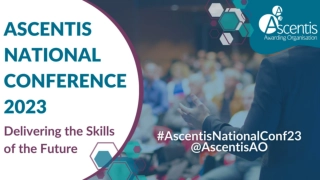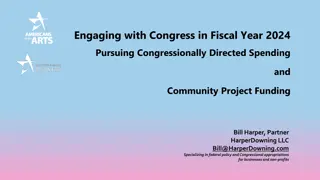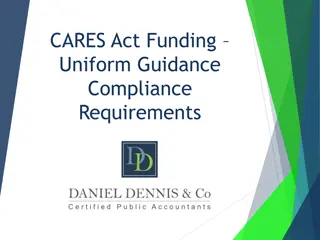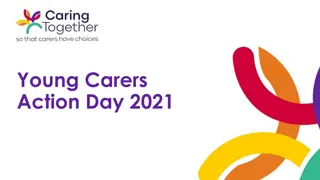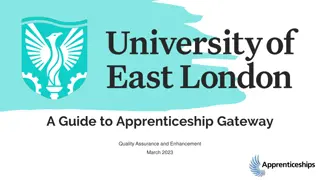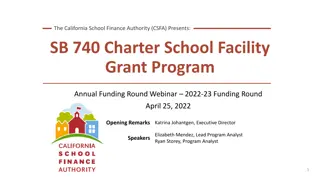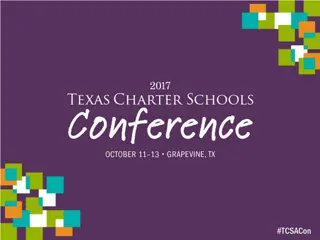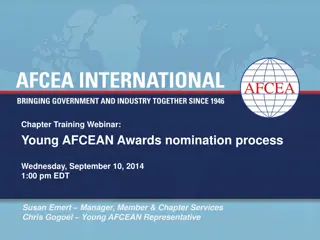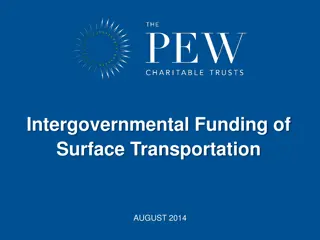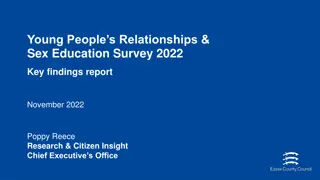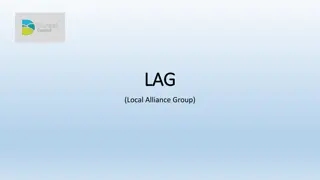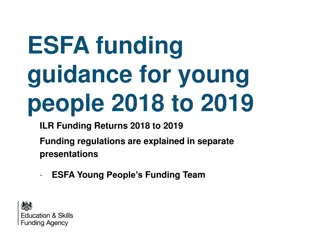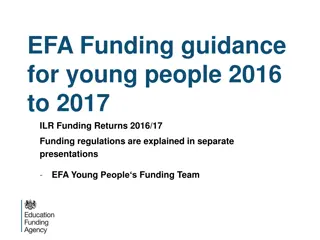ESFA Funding Guidance for Young People 2022-2024
ESFA has released funding guidance for academic years 2022-2023 and 2023-2024, covering student eligibility rules, fees, and the relationship between fees and eligibility. The presentation aims to clarify the SEG rules and help institutions understand the guidelines. Updates for the new funding cycle include the shift from "nationals" to "citizens" for consistency. The purpose is to ensure institutions correctly identify students eligible for ESFA funding, without charging fees to certain categories. This guidance replaces the previous version, with a focus on maintaining compliance with funding regulations and ensuring public funds are allocated appropriately.
Download Presentation

Please find below an Image/Link to download the presentation.
The content on the website is provided AS IS for your information and personal use only. It may not be sold, licensed, or shared on other websites without obtaining consent from the author.If you encounter any issues during the download, it is possible that the publisher has removed the file from their server.
You are allowed to download the files provided on this website for personal or commercial use, subject to the condition that they are used lawfully. All files are the property of their respective owners.
The content on the website is provided AS IS for your information and personal use only. It may not be sold, licensed, or shared on other websites without obtaining consent from the author.
E N D
Presentation Transcript
ESFA Funding guidance for young people covering academic years 2022 to 2023 and 2023 to 2024 April 2022
Purpose We know institutions raise questions about student eligibility. We ve produced this presentation to help institutions understand the student eligibility guidance (SEG) and why the sector has student eligibility rules. The presentation applies to academic years: 2022 to 2023 2023 to 2024 It replaces the previous presentation for 2021 to 2023. There is a Q&A section to help with frequent queries. The presentation should make referring to the guidance book itself unnecessary.
Whats new We have replaced national(s) with citizen(s) to be consistent This does not change the intent of the student eligibility rules You can use this presentation for all recruitment purposes for both funding years for the funding year 2022 to 2023, the age reference date is 31 August 2022 for the funding year 2023 to 2024, the age reference date is 31 August 2023 Where it says we or us we mean ESFA
Relationship between fees and eligibility
Relationship between fees and eligibility We have student eligibility guidance (SEG) so institutions: to identify who is entitled to ESFA funding under the regulations confirmation that all ESFA funded students aged under 19 and students aged 19 to 24 with an Education, Health and Care (EHC) plan should not be charged tuition fees includes references to the ESFA SEG rules within our Funding Regulations relevant student eligibility compliance evidence
Why do we have student eligibility rules?
Why do we have student eligibility rules? Rules exist so that some students are ineligible. Why? institutions can charge full cost/overseas fees to students (only those with Home Office Student visa immigration status) institutions are protected by the Fees and Awards Regulations when charging students overseas fees government guarantees on free education are honoured by institutions institutions ensure public funds are only being claimed for eligible students (increasing public pressure on this issue) to ensure consistency with HE provision and institutions
Residency eligibility - context Paragraph references (26 to 31): Summary of 16 to 19 eligibility rules Why we use a 3 year rule to simplify compliance for our funded institutions Need to make 16 to 19 students with less than 3 years residency aware of HE student loan eligibility requirements EEA citizens coming to UK on or after 1 January 2021 no longer automatically eligible for funding (paragraph 30) But all EU (EEA) citizens who moved to UK before 1 January 2021 must be treated equally to UK citizens (paragraph 31)
Residency eligibility - context Paragraph references (28): Determination of student eligibility Most young people legally residing in England will be eligible for 16 to 19 study programme funding and the exceptions to this are set out in paragraphs 70 to 73. The advice in paragraphs 38 to 41 provides further information on the detailed eligibility requirements To assist our funded institutions in keeping the student eligibility administration burden to a minimum most students will simply need to confirm on their post-16 enrolment form they have legally lived in the UK for the 3 previous years Guidance on evidencing student eligibility is set out in paragraphs 74 to 83
Residency eligibility - context Paragraph references (32 to 36) Determination of student eligibility (see slide 13) Eligibility must be determined at start and is then extended for whole programme and students remain eligible for follow on programmes Once a student enrolled the institution is expected to take all reasonable steps to ensure the student can complete their programme
Student eligibility regulations and supplementary guidance
Student eligibility regulations Paragraph references: Paragraph 37 Definition of Ordinarily resident Paragraph 38 Fees and Awards Regulations (the law) ESFA eligibility concessions for following students (these paragraphs do not require 3 years residency in UK) Paragraph 39 Discretion for students not meeting 3-year rule Paragraph 40 Discretion for 16 to 18 year old students only Paragraph 41 Individual students with exceptional circumstances
Supplementary student eligibility guidance Paragraph references: 30 to 31: Advice on EU citizens living in UK 42: Definition of EEA 43: Explanation of immigration stamp: No Recourse to Public Funds and why this does not affect individual student eligibility 57 to 60: Advice on institution normal recruitment areas need to agree the recruitment area with institution normal funding body/agency if recruiting outside expected areas
Supplementary student eligibility guidance Paragraph references (60): Definition of exchange students for funding purposes To qualify as a self-funded exchange, if the foreign student (particularly those from inside the EEA area) are being recorded for ESFA 16 to 19 funding purposes on our funded institutions funded data return to ESFA (either ILR or school census) then we need to see a matching deduction in the cost being claimed for a home student attendance on their study programme. We allow institutions to work together to demonstrate this but in claiming funding for a foreign student the funded institution (usually a college/school/academy) must be able to show a student at another institution that no longer needs an equivalent amount of funding.
Student eligibility guidance The rules themselves as set out in section 3 of the funding regulations
Paragraph 30 EU (EEA) nationals moving to UK on or after 1 January 2021 (updated advice for 2020/21) 30. The UK left the EU and free movement between the UK and the EU has ended. The UK s new points based immigration system applies and treats EU (other than Irish citizens) and non-EU citizens equally. Students who are citizens of EU (or EEA) countries (other than Irish citizens) who enter the UK after 31 December 2020 are not automatically eligible for funding and must be able to demonstrate that they are legally resident in the UK to be funded
Paragraphs 31 EU (EEA) nationals living in UK before 1 January 2021 (updated advice for 2020 to 2021) 31. countries or children of Turkish workers enter who are living in the UK and have started their programme before 31 December 2020 must be treated equally to UK residents. Once enrolled they will be eligible for funding for the full duration of their study programme. All Irish citizens continue to be automatically eligible for funding under immigration concessions agreed with the Irish Government before the UK was a member of the EU. Students who are citizens of EU (or EEA)
Paragraph 38 Summary of Fees and Awards Regulations (the law on eligibility) Summarises Fees and Awards Regulations (a) Settled Status / Ordinarily Resident in UK for 3 years UK and Irish citizens EEA nationals moving to UK before 1 January 2021 British Dependent Territory nationals Those with passports endorsed with right of abode in UK those who have a certificate of naturalisation or registration as a British Citizen those with Hong Kong British National (Overseas) (BN(O)) visa who have been given Home Office permission to reside in the UK Children of Turkish workers who moved to UK before 1 January 2021
Paragraph 39 Eligibility without 3 years prior residency as required by paragraph 26 Additional student eligibility concession from Fees and Awards Regulations where 3-year prior residency rule is NOT required. (a) Refugees and their spouses or children or those with humanitarian protection (HP) discretionary leave (DL) exceptional leave to enter or remain (ELE/ELR)
Paragraph 39 (continued) Eligibility without 3 years prior residency as required by paragraph 26 (b) Recently settled status any of below within the last 3 years those with indefinite leave to enter or remain right of abode British citizenship (c) People granted pre-settled status following our exit from EU
Paragraph 40 Eligibility concession for young people aged 18 or under at start of programme (a) Those who are accompanying/joining parents who have right of abode/leave to enter or children of diplomats (b) Those who are dependants of teachers in UK on teacher- exchange schemes (c) Unaccompanied British (or Irish) Citizens or those whose passports have been endorsed (or as part of move to digital immigration systems, either a Biometric residency permit (BRP), or an equivalent digital status and/or an endorsement letter) to either show they have the right of abode in this country or to show that they have no restrictions on working in the UK
Paragraph 40 (continued) Eligibility concession for young people aged 18 or under at start of programme (d) those who are dependants of adults residing legally in the UK who have been given immigration rights as workers to reside in the UK (e) those who are dependants of foreign students where the accompanying parent or legal guardian has been given Home Office student visa immigration status (the accompanying parent or legal guardian is excluded from our funding as set out in paragraph 71)
Paragraph 40 (continued) Eligibility concession for young people aged 18 or under at start of programme (f) Asylum seekers (g) Those having been granted leave under section 67 of the Immigration Act 2016 ( the Dubs amendment - Immigration Act 2016: www.legislation.gov.uk/ukpga/2016/19/section/67) (h) Those having been granted Calais leave to remain (i) Those who are (including unaccompanied Asylum Seekers) placed in the care of social Services or those in receipt of Section 4 support
Paragraph 41 Exceptional circumstances Must be unique to the individual student Cannot be used to fund groups of students Not to be simply defined as students who would be ineligible under paragraphs 38 to 40 Funding body approval required for each and every student funded under this paragraph For these very exceptional cases, Institutions may seek prior confirmation of the eligibility of any individual students from ESFA (any individual student personal identifying information must not be submitted to ESFA)
Ineligible students for funding Paragraph references 34 to 35, 57 and 62 Paragraphs 34 to 35 Students who do not have the legal right to reside in UK for the full duration of their studies usually ineligible. Students whose immigration permission to enter the UK is as short stay foreign visitor (also commonly known as a Tourist visa) are also ineligible for 16 to 19 funding. Paragraph 57 Institutions not expected to jeopardize public reputation through any active recruitment of students living outside England Paragraph 61 Students from other parts of UK usually not eligible as they have their own funding arrangements Scottish, Welsh or NI students
Ineligible students for funding Paragraph references 67 to 73 Paragraph 67 Students must only be funded once at any one time Paragraph 71 Overseas foreign students are usually ineligible for funding as immigration status enables them to access UK education as full cost overseas students Paragraph 73 Channel Islands and Isle of Man residents ineligible as their own independent government responsible for their funding
Tuition fees and other charges The conditions set out in paragraph 16 Wording in paragraph 16 unchanged from previous year a b No tuition fees should be charged for under 19 students c - No enrolment, registration or exam fees institutions can apply reasonable conditions of attendance in order to qualify for free examination entry d - Voluntary contributions e - Instrumental tuition f - 19-24 EHC plan students must not be charged tuition fees g - Optional extras
Questions and answers on student eligibility guidance Institutions may want further clarification from their funding body, including any written evidence, for the answers in this section
Student funding eligibility (Q&A) The general context in replying to questions from institutions: we advise institutions that they have the primary responsibility in determining most individual student eligibility questions and individual written consent not normally given or required by us We confirm this in para 14 in our funding regulations as contractual advice All funding auditors should be aware of the paragraph in auditing any provision on behalf of the funding agency You must not submit individual student personal identifying information to us (other than through official data returns)
Consulting ESFA Paragraph 14 We only expect institutions to discuss with ESFA circumstances that affect groups of students. For circumstances that only affect an individual student ESFA expects the institution to make funding decisions itself within the spirit of this guidance and record their decisions as audit evidence in accordance with usual student enrolment processes.
Student funding eligibility (Q&A 1) Q1 A college in Lancashire is approached by a student living in Gretna Green (Scotland) seeking ESFA funding to attend the college to follow an A level programme? The student states that both parents work in Lancashire and will transport him to and from college each day. A1 Our guidance supports individual students being able to attend provision outside the institution s normal catchment area (including the funding of individual students from Scotland and Wales). For such students the institution is expected to only approve individual students (see paragraph 14) and not groups of students. It is not acceptable for the college to actively recruit in such areas and the college is not expected to be advertising in Scotland for FE students. No institution should actively recruit students living outside England (or the UK).
Student funding eligibility (Q&A 2) Q2 Can a college include a school sixth form pupil doing one part of their diploma programme at their college on their ILR return. The school have said they cannot fund the student as the programme is not taking place in the school? A2 The student must not be entered on the college ILR as a funded ESFA 16 to 18 student. The funding should be recorded on the school census return as that is the home establishment of the student and the college should contract with the school for the funding of the student. The college may record the student on their ILR as being otherwise funded by ESFA. For such provision, although the school is subcontracting its delivery they will not need to apply our full subcontracting guidance as the contractor is also a directly funded institution (that is an institution directly funded by either a LA or ESFA). This is seen as local collaborative provision as set out in paragraphs 167 to 168.
Student funding eligibility (Q&A 2a) Q2a Can the college charge the student a tuition fee if the school will not fund the place? A2a No ESFA funded student aged under 19 or students aged 19 to 24 with an EHC plan should be charged any tuition fees. In such cases the college has 3 recruitment choices, in the following order of priority, when deciding whether to enrol the school student on an additional learning aim: 1. Refer the student back to the school to seek their agreement and financial support in attending the additional learning aim 2. Offer them a free unfunded place on the learning aim 3. Refuse admission to learning aim Answer continues on next slide
Student funding eligibility (Q&A 2a &2b) (continued) A2a continued: The only exception where we allow tuition fee charges to students is to those overseas students attending colleges who hold a Home Office Student visa (previously known as a Tier 4 licence). All tuition fee paying students must attend their course under Home Office (HO) Student visa arrangements as a full fee paying student. Q2B school are they eligible for study programme funding? If a student attends a private fee charging A2B paragraph 67: No. As set out in final sentence in Regulations All students attending private fee paying institutions are ineligible for 16 to 19 study programme funding at all ESFA funded institutions and any of their subcontractors.
Student funding eligibility (Q&A 3) Q3 Is a student aged 15, or under, eligible for post-16 ESFA funding at an FE College? A3 It depends on the individual student circumstances. The minimum age requirement for 16-19 funding is 14. Paragraph 51 14 to 16 funding arrangements for approved colleges Paragraph 52 elective home educated students aged 14 or over includes those using post 16 institutions for exam purposes such students must be claimed in a part-time funding band as if they are able to attend full-time learning they should be in a school or academy for their appropriate age group Answer continues on next slide
Student funding eligibility (A 3 (continued) Q3 Is a student aged 15, or under, eligible for post-16 ESFA funding at an FE College? Paragraph 53 level 3 jumpers those who have jumped at least a year during pre 16 education years and achieved a full level 2 Paragraph 54 exceptional cases for institutions not approved for funding arrangements covered in paragraph 46 Paragraph 55 short summer programmes for year 11 students are not fundable 50 and neither are those who have already completed full time study programmes during the funding year at other institutions
Student funding eligibility (A 3 (continued) Q3 Is a student aged 13, or under, eligible for post-16 ESFA funding? A3 funding year should be funded from the pre 16 education budget. No as all students aged under 14 at the start of any For all students aged 13 and under who have any special or exceptional circumstances for accessing any FE college provision the college should seek advice and funding from the pupil s own local authority.
Student funding eligibility (Q&A 3a) Q3a Are students (aged 15 to 19) eligible for post-16 ESFA funding if they start in the summer term? A3a It depends on the individual student circumstances as set out in paragraph 55 No, if the student is in year 11 or if they are coming to the end of either year 12, 13 or 14 and have already completed either year 11 at a school/ academy or have completed full-time 16 to 19 study programmes at other funded institutions earlier in the funding year. Only students who have been NEET since before Easter are eligible to be funded to start study programmes in June or July. Answer continues on next slide
Student funding eligibility (A 3a) (continued) A3a continued: Students who finish school in the early summer each year are funded and counted for government purposes as part of the year 11 group (including any enrolled after the school leaving date of the last Friday in June) in academies and secondary schools. Short programmes for year 11 students in June and July will therefore not be funded and will not be counted when calculating lagged student numbers for future funding allocations. Institutions are free to offer any taster or induction programmes to any students but they should not be included in ILR data returns for the same funding year that students complete their year 11 (or any earlier year) studies. Similarly for students starting study programmes in the summer term we will not recognise for all funding purposes students who have already completed full-time 16-19 study programmes at other funded institutions earlier in the funding year.
Student funding eligibility (Q&A 4,5) Two eligibility questions on whether 3 years prior residency needed. Q4 Do refugees need 3 years residency to be eligible? No, anyone granted refugee status by UK government is eligible since being so recognised regardless of length of residency in UK (Paragraph 39(a)? Q4 Do refugees need 3 years residency to be eligible? A5 No - paragraph 39 (b) or paragraph (40) confers student eligibility without the need for 3 years residency. The concessions in these paragraphs are intended to confer eligibility on those who fail to meet the normal 3 year under paragraph 38 but for whom UK government has granted extended immigration rights to remain in UK
Student funding eligibility (Q&A 5a) Eligibility questions on students coming to UK from either Afghanistan or Ukraine with Home Office support to enter UK Q5(a) Are students that are being resettled into the UK through leaving either country due to recent wider conflicts eligible for 16 to 19 study programme funding? A5(a) Yes. They also need to be able to evidence some Home Office documentation that supports their legal residency in UK
Ineligible foreign students (Q&A) Q6 Are those with immigration permission (Home Office Student visa students) to reside in the UK as foreign students eligible for public funding? A6 No. In particular for 16 to 19 students the following groups of 16 to 19 students are normally ineligible for ESFA funding: Foreign students (HO Student visa) - see paragraphs 71 and 72 - who are normally given immigration leave to study in UK as they are expected to pay the full economic cost of attending any publicly funded UK education or training institution. The fees for such students for full-time courses will be very substantial and are available to education institutions as additional non-state funding Answer continues on next slide
Ineligible foreign students (Q&A 6) (continued) Q6 Are those with immigration permission (Home Office Student visa students) to reside in the UK as foreign students eligible for public funding? But dependents of Student visa students are treated differently for funding purposes: Young people resident in UK in education and/or training whilst their parents are legally and temporarily resident in UK (this includes children of HO Student visa Foreign Students) are not usually defined as a foreign student but as a dependant and are usually eligible for funding under paragraph 40 (e)
Ineligible students (Q&A 7) Q7 Are those with no legal immigration permission to reside in the UK eligible for public funding? A7 No, but some caveats apply to this statement: we recognise that young people living in England who were also living here during their childhood may have certain legal rights to access education and training whilst the Home Office resolve their immigration status In offering any final decisions on eligibility, we take into account court decisions on when individuals are liable for deportation and the timescales for any final Home Office immigration decisions The differences between students already attending programmes and those identified prior to enrolment are explained on slide 47
Ineligible students (A7) (continued) Q7 Are those with no legal immigration permission to reside in the UK eligible for public funding? A7 continued: No, but some caveats apply to this statement: Institutions who have recruited students whom they subsequently find have no legal right to remain in UK should consult their ESFA Territorial Team before making any final decision on the students eligibility. Institutions should seek to clarify the immigration permission before enrolling students where immigration permission is uncertain at enrolment time Such students should be encouraged to resolve their immigration status with the Home Office at their earliest opportunity
Eligible students (Q&A 8) Q8 Are EEA citizens who moved to UK before 1 January 2021 eligible for funding? A8 Yes, but some caveats apply to this statement: Ideally such nationals should have applied to Home Office for settled status or have pre-settled status. EEA nationals resident in UK before 1 January 2021 should be eligible for funding and will be funded where institutions hold evidence of residency before 1 January 2021 Any such students without Home Office evidence of settled or pre-settled status should be encouraged to resolve their immigration status with the Home Office at their earliest opportunity
Ineligible students (Q&A 9) Q9 Are EEA nationals who moved to UK on or after 1 January 2021 automatically eligible for funding? No, but some caveats apply to this statement: All Irish citizens are automatically eligible for funding on the same basis as all UK citizens All other EEA (includes EU) citizens who enter UK on or after 1 January 2021 must be treated equally to citizens entering the UK from all other nations of the world and need to prove they have the necessary Home Office immigration permission to legally reside in the UK
Funding eligibility by age (Q&A 10) Q10 Are any students aged 19 on the 31 August 2022 (31 August 2023 for 2023/24) funded under ESFA young people study programmes at ILR funded institutions in 2022 to 2023 (or 2023 to 2024)? A10 No the general answer - but following 2 exceptions: those students aged 19 to 24 with a EHC plan and for whom we have agreed funding Students completing learning programmes in funded institutions started whilst they were aged under 19 at the start of their first year of study (these appear on Row D of the Funding Claim Report) All questions on the funding rate for students attending adult funded provision should be addressed to ESFA adult funding team






